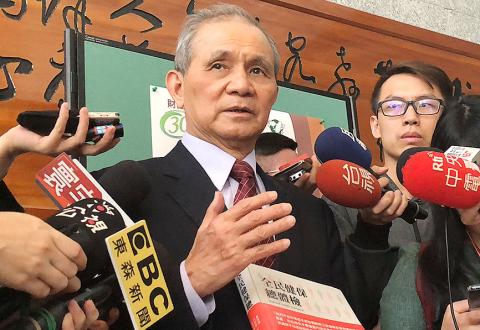The Executive Yuan yesterday announced the names of the leaders and some of the members of the government’s transitional justice promotional committee, saying the list would be sent to the Legislative Yuan for approval once it is complete.
Premier William Lai (賴清德) on Tuesday confirmed that the committee is to be headed by 74-year-old former Control Yuan member Huang Huang-hsiung (黃煌雄), Executive Yuan spokesman Hsu Kuo-yung (徐國勇) told a press conference in Taipei.
“Huang joined dangwai [黨外, “outside the party”] activities in the early days and is a prominent democracy advocate in Taiwan,” Hsu said. “He is widely recognized in political circles as an impartial individual who shows a strong sense of mission toward Taiwan.”

Photo: CNA
Huang is one of the few people who, despite adhering to pro-Taiwanese independence views, could be embraced by both the pan-green and pan-blue camps, which makes him an ideal candidate for the chairmanship, Hsu said.
The committee’s vice chairman is to be Mainland Affairs Council Deputy Minister Chang Tien-chin (張天欽), a legal expert who served on the board of the now-disbanded Improper Martial Law Period Insurgency and Espionage Convictions Compensation Foundation.
Established in 1999 by the Executive Yuan, the foundation was tasked with compensating victims of persecution during the Martial Law period. It handled more than 10,000 cases and awarded about NT$19.6 billion (US$673 million) in compensation before it was dissolved in 2014.
Hsu said Chang’s legal knowledge, coupled with his experience working in the government, supplements Huang’s qualities.
Hsu also named four part-time committee members, including Presbyterian Church in Taiwan assistant director-general pastor Eleng Tjaljimaraw (高天惠), a Paiwan who also sits on the Presidential Office’s Indigenous Historical Justice and Transitional Justice Committee.
Judicial Reform Foundation member Greg Yo (尤伯祥), Academia Sinica Institute of Taiwan History director Hsu Hsueh-chi (許雪姬) and National Taiwan University history professor Hua Yih-fen (花亦芬) were also nominated.
Yo is equipped with a deep sense of justice and has often represented victims of wrongful convictions, Hsu Kuo-yung said, adding that Hsu Hsueh-chi has been deemed a “walking Wikipedia” for Taiwanese history, particularly concerning the 228 Incident and the White Terror era.
Although Hua is also a part-time member of the Cabinet’s Ill-gotten Party Assets Settlement Committee, sitting on both committees would not lead to conflict, Hsu said.
The three full-time members for the transitional justice committee have also been determined, but their names would be announced once they complete administrative procedures at their current posts, Hsu Kuo-yung said.
Under the Act on Promoting Transitional Justice (促進轉型正義條例), the committee should consist of a chairperson, a vice chairperson, three full-time members and four part-time members.
Their tenure is not to expire until after the committee completes its initial task of compiling a detailed investigative report, a plan of action and draft legislation, which it is to do within two years before being dissolved.
228 Incident expert Chen Tsui-lien (陳翠蓮) is rumored to have been among the nominated committee members, but Chinese-language Up Media on Thursday cited an anonymous source as saying that she declined the offer because she believed that Huang did not know enough about transitional justice to head the committee.
Hsu yesterday declined to comment on the report.

Alain Robert, known as the "French Spider-Man," praised Alex Honnold as exceptionally well-prepared after the US climber completed a free solo ascent of Taipei 101 yesterday. Robert said Honnold's ascent of the 508m-tall skyscraper in just more than one-and-a-half hours without using safety ropes or equipment was a remarkable achievement. "This is my life," he said in an interview conducted in French, adding that he liked the feeling of being "on the edge of danger." The 63-year-old Frenchman climbed Taipei 101 using ropes in December 2004, taking about four hours to reach the top. On a one-to-10 scale of difficulty, Robert said Taipei 101

A preclearance service to facilitate entry for people traveling to select airports in Japan would be available from Thursday next week to Feb. 25 at Taiwan Taoyuan International Airport, Taoyuan International Airport Corp (TIAC) said on Tuesday. The service was first made available to Taiwanese travelers throughout the winter vacation of 2024 and during the Lunar New Year holiday. In addition to flights to the Japanese cities of Hakodate, Asahikawa, Akita, Sendai, Niigata, Okayama, Takamatsu, Kumamoto and Kagoshima, the service would be available to travelers to Kobe and Oita. The service can be accessed by passengers of 15 flight routes operated by

Taiwanese and US defense groups are collaborating to introduce deployable, semi-autonomous manufacturing systems for drones and components in a boost to the nation’s supply chain resilience. Taiwan’s G-Tech Optroelectronics Corp subsidiary GTOC and the US’ Aerkomm Inc on Friday announced an agreement with fellow US-based Firestorm Lab to adopt the latter’s xCell, a technology featuring 3D printers fitted in 6.1m container units. The systems enable aerial platforms and parts to be produced in high volumes from dispersed nodes capable of rapid redeployment, to minimize the risk of enemy strikes and to meet field requirements, they said. Firestorm chief technology officer Ian Muceus said

MORE FALL: An investigation into one of Xi’s key cronies, part of a broader ‘anti-corruption’ drive, indicates that he might have a deep distrust in the military, an expert said China’s latest military purge underscores systemic risks in its shift from collective leadership to sole rule under Chinese President Xi Jinping (習近平), and could disrupt its chain of command and military capabilities, a national security official said yesterday. If decisionmaking within the Chinese Communist Party has become “irrational” under one-man rule, the Taiwan Strait and the regional situation must be approached with extreme caution, given unforeseen risks, they added. The anonymous official made the remarks as China’s Central Military Commission Vice Chairman Zhang Youxia (張又俠) and Joint Staff Department Chief of Staff Liu Zhenli (劉振立) were reportedly being investigated for suspected “serious